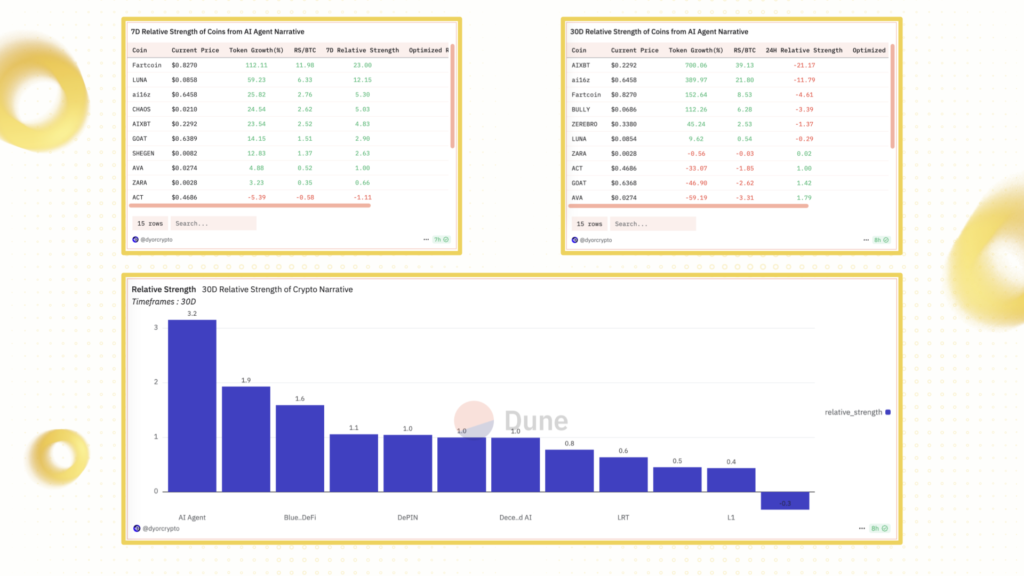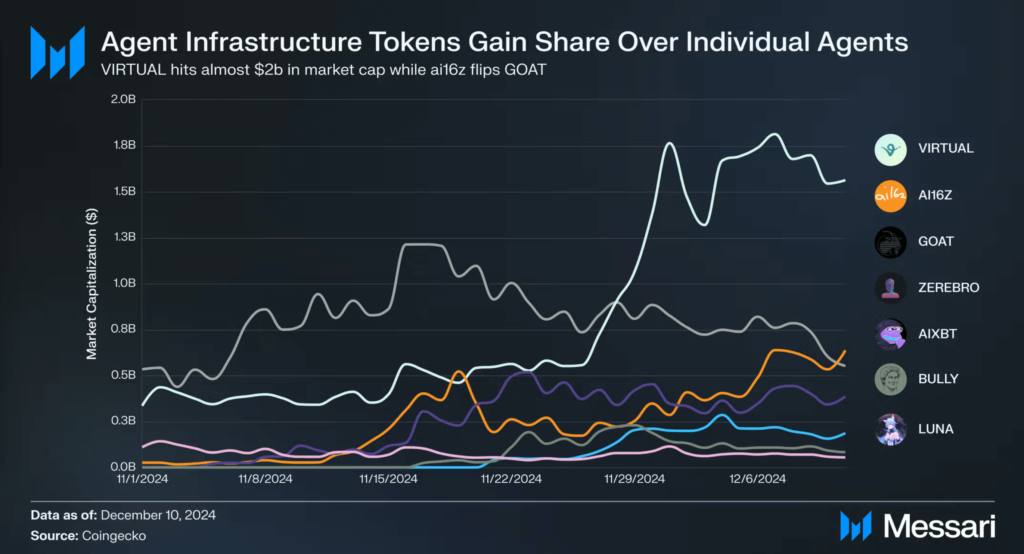The free, decentralized “open market” model of projects like ai16z is in a race with AI Agent projects adopting the “cathedral” model, which emphasizes the ability to generate immediate economic value

a16z Founder: “I have that ai16z shirt too”
In late October 2024, Marc Andreessen – co-founder of the venture capital firm a16z – posted on his personal X (formerly Twitter) account an AI-generated image of a girl wearing a t-shirt with the inscription “ai16z,” along with the tweet: “Hey, I have that shirt too.” This was Andreessen’s playful response to the launch of the AI-powered DAO project ai16z, which was inspired by him.
It was all in good fun, but the ripple effect was real. Following Andreessen’s statement, ai16z’s market cap surged to nearly $100 million (and has reached over $750 million at the time of writing).
Following in ai16z’s footsteps, AI agent projects have become the most prevalent narrative in the crypto market over the past two months. According to Dune Analytics statistics, AI agents currently lead in terms of community awareness (mindshare) over the last 30 days, with ai16z ranking in the top 3 of mindshare rankings for the past 7 and 30 days.

On December 10th, Kaito AI announced on X that the ai16z token had surpassed GOAT in terms of market capitalization, demonstrating the project’s pioneering role with its AI-powered investment fund model in the crypto market.
“With ai16z, we are not only building an AI DAO, but also paving the way for a powerful combination of AI and DeFi, where systems can operate automatically, flexibly, and better serve humanity,” shared Shaw, the founder of ai16z, in a recent interview with Bankless.
Read more: ai16z – An AI Agent Model Functioning as an Investment Fund
ai16z More Popular on Github than Uniswap
Behind the ai16z explosion is Eliza Framework – the core technology platform that allows for the integration of multiple AI agents and opens up opportunities to develop independent dApps.
Messari’s recent “Framework Fortresses” report also emphasized that building an open infrastructure ecosystem like Eliza offers long-term advantages that go beyond typical DAOs. Eliza is not just a framework; it’s a new generation “operating system” for AI agents on the blockchain.

Currently, Eliza Framework is the most popular repository on Github, having been forked over 1,500 times with contributions from over 170 developers worldwide.
Another factor demonstrating ai16z’s growth is that despite being launched less than two months ago, the number of stars on the Eliza repository has already surpassed that of Uniswap, a well-known DeFi protocol established in 2018.
Despite its immense popularity, ai16z also faces fierce competition from rival projects and the pressure to maintain continuous innovation. To solidify its position, the project has partnered with Ryze Labs to launch the AICombinator program, providing a $5 million fund to support AI and blockchain developers.

More recently, on December 16th, Eliza Labs – the organization behind ai16z – further expanded its influence by partnering with Stanford University on the “Future of Digital Currency Initiative” research project.
This project utilizes the Eliza open-source framework to “address fundamental questions about how AI agents can establish trust, coordinate actions, and make decisions within decentralized financial systems,” Eliza Labs stated.
According to Professors Dan Boneh and David Mazières from Stanford, this is a “unique opportunity to shape how AI agents will operate in the digital economy.”
ai16z vs. Virtuals: The Race Between the “Cathedral” and the “Bazaar”
While ai16z and its Eliza Framework are attracting significant attention, their competitor Virtuals is also creating a new trend with its model of tokenizing AI agents. The project allows users to share in the revenue generated by these tokens, while also implementing mechanisms like “buyback and burn” aimed at reducing inflation and increasing token value.
Virtuals – with a market capitalization reaching $1 billion by the end of November 2024 – employs an approach likened to “The Cathedral” – a systematic and purposeful development model led by a core development team. Meanwhile, ai16z and Eliza Framework represent “The Bazaar” approach – a decentralized and free development philosophy where innovation is driven by the developer community.
With ai16z’s open framework, anyone can experiment, deploy, and contribute to AI agents without being constrained by rules.

ai16z and Virtuals represent two distinct visions: one focuses on sustainability and long-term interoperability through open infrastructure, while the other emphasizes rapid growth and the ability to generate immediate economic value from AI agents.
Regardless of which model prevails in the long run, it’s safe to say that AI agents are poised to become a core foundation of decentralized ecosystems in the future.
Furthermore, the market is shifting its focus from independent AI agent tokens to infrastructure tokens like Eliza Framework (ai16z) or VIRTUAL, according to Chain of Thought.

“AI agents are just the beginning. Our goal is to move towards a future where AI and the community create tangible value together,” shared Shaw, the founder of ai16z.
Read more: Artificial General Intelligence (AGI) & Humans – Is the Cyborg Future Approaching?

